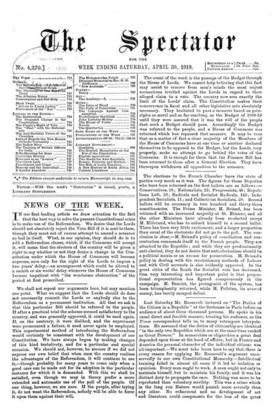We shall not repeat our arguments here, but may mention
one point. What we suggest that the Lords should do does not necessarily commit the Lords or anybody else to the Referendum as a permanent institution. All that we ask is that this particular Bill should be referred to the people. If after a practical trial the scheme seemed satisfactory to the country, and was generally approved, it could be used again. If, on the contrary, it were disliked, and the experiment were pronounced a failure, it need never again be employed. This experimental method of introducing the Referendum would certainly be consistent with the development of our Constitution. We have always begun by making changes of this kind tentatively, and for a particular and special occasion. We should not, however, be sincere if we did not express our own belief that when once the country realises the advantages of the Referendum, it will continue to use it,—though probably for many years to come only when a good case can be made out for its adoption in the particular instance for which it is demanded. With this we shall be satisfied, even though we may in theory prefer a more extended and automatic use of the poll of the people. Of one thing, however, we are sure. If the people, after trying it, do not want the Referendum, nobody will be able to force it upon them against their wilL


























































